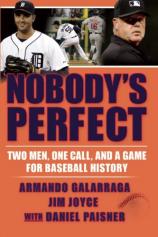Nobody's Perfect: Two Men, One Call, and a Game for Baseball History
Review
Nobody's Perfect: Two Men, One Call, and a Game for Baseball History
One of the highlights of the 2010 Major League season was something that didn't happen.
Armando Galarraga, a pitcher for the Detroit Tigers, did not get his perfect game --- a no-hit, no-run effort in which no opposing player gets on base via a walk, error, or any other means. There have only been 20 in the history of the national pastime, so it's obviously something special.
Paisner does a commendable job in the project, showing a humanity in the sports world that's rarely noted.
Pitchers have no-hitters broken up all the time, but Galarraga was flawless in his June 10th start against the Cleveland Indians. With two out in the ninth inning, Jason Donald --- the last man standing in the way of perfection --- hit a ground ball that first baseman Miguel Cabrera, in his enthusiasm, ranged perhaps a bit too far to field. He threw to Galarraga, who had run to cover first and was there in plenty of time to get the runner out.
Game over! The fans went wild, the broadcasters started heaping their praise...
But wait. Jim Joyce --- an umpire with more than 20 years of experience --- called the runner safe? Replays clearly showed that Donald was out, but there was no recourse, no mechanism to reverse the call. There was no tirade or cursing from Galarraga (perhaps the only one to react so calmly). He could only offer a little grin in disbelief before retiring the next batter to settle for the one-hitter.
Pundits --- both sports-related and not --- suggested if ever there was a time for baseball commissioner Bud Selig to overrule an outcome, this would be it. The play absolutely would have ended the game. Galarraga deserved it. No one would complain about setting precedents (well, some might, but the good outweighed the bad here).
It was Galarraga's reaction --- that beatific smile --- that could be seen as the genesis for NOBODY'S PERFECT.
Daniel Paisner goes back and forth between the two main figures, starting with their disparate courses to the Major Leagues. Galarraga grew up in Venezuela and came up through a particular path set for players from Central and South America. It's a bumpy road, full of cultural and language barriers, frustrations, trades and injuries. Joyce was an aspiring pitcher without the tools to make it as a professional who then turned to umpiring. (An interesting connection: Both men thought about quitting but were talked out of it by their wives.)
The alternating first-person format between Galarraga and Joyce is interesting in the differences between their voices. The former is quite formal, with few contractions (almost like Mr. Spock from "Star Trek"). It is also unusually respectful as Galarraga refers to most of his elders, including the umpire, as "Mr." so-and-so. Joyce, on the other hand, barely offers full sentences and is more folksy in his delivery. At times, however, this comes off a bit strained, like a movie narration in which the foreign-born character actually speaks "properly," but not in the natural flow of "regular" conversation.
The actual contest between Detroit and Cleveland takes up only the last third of the book. Galarraga runs through his strategy for each batter; Joyce claims not to have paid that much attention until the final innings. When the penultimate play occurs, the Tigers pitcher is humble; he's not angry but grateful. Very Zen. After all, you can't control what you can't control, so why worry about it?
Although he was sure of the call when he made it, Joyce was mortified when he realized his gaffe and that he had unintentionally cheated Galarraga out of his place in the record book. If he could, Joyce would have reversed it in a heartbeat. After sitting in the umpires' room for an hour after the game, he asked to talk with Galarraga to offer his apology, which was immediately accepted, even as the sports cable shows were showing the replays and calling for the umpire's head, the installation of instant replay to overrule calls, and dispensation for the pitcher from Selig and/or President Obama.
Paisner does a commendable job in the project, showing a humanity in the sports world that's rarely noted. One minor quibble: I think the depiction of Galarraga and Joyce should be switched on the dust jacket of the next printing. The pitcher is currently on the lefthand side; he should actually be on (in) the right.
Reviewed by Ron Kaplan on June 28, 2011
Nobody's Perfect: Two Men, One Call, and a Game for Baseball History
- Publication Date: June 12, 2012
- Genres: Nonfiction, Sports
- Paperback: 256 pages
- Publisher: Grove Press
- ISBN-10: 0802145876
- ISBN-13: 9780802145871




